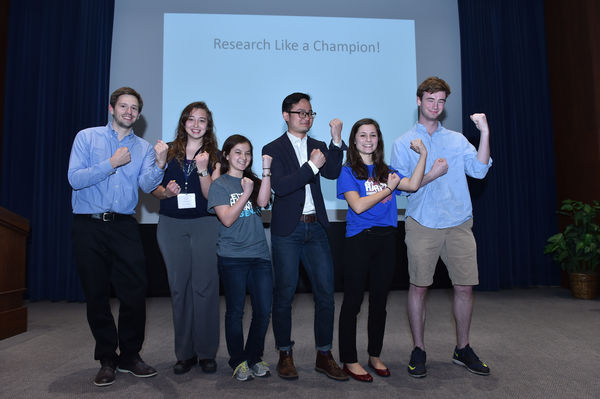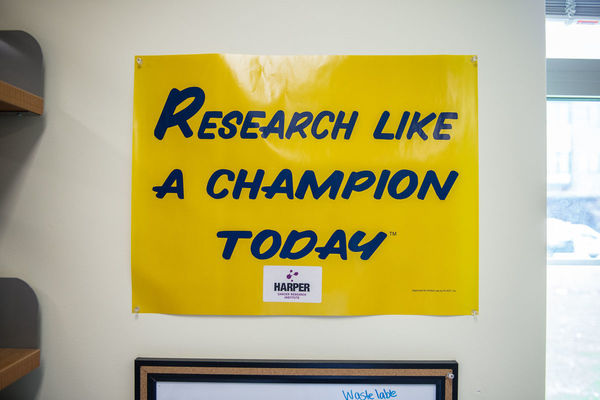Congratulations to the 2015 Research Like a Champion awardees!
Across campus, Individual Notre Dame students or groups of students who chose to work in a team, submitted research proposals looking into the causes, treatment, and prevention of cancer. The contest was open to students across all disciplines, who had innovative approaches to the fight against cancer.
The winning proposals received $12,500 in support summer student stipends, research supplies, and travel throughout the upcoming academic year and summer.

The 2015 Research Like a Champion awardees are:
(in random order)
SolWatch and SolPatch
Researcher: Luke Maillie, Physics in Medicine (2018)
Mentors: Arati Sharma, Penn State College of Medicine; Mike Vogel and Norb Weich, Entrepreneurs-in-Residence, Notre Dame
This project addresses the problem of exposure to ultraviolet (uv) radiation, a major cause of skin cancers. The premise is simple: most people, particularly children, are unaware of the amount of uv radiation they are exposed to in a given period of time outdoors. What if quantifying your exposure using the uv index, the standard measure for uv radiation, was as easy at looking at your watch? What is kids could wear a glowing ‘band-aid’ that reminds them to get out of the sun or apply more sunscreen? Freshman Physics major Luke Maillie is collaborating with a team comprised of melanoma researchers and entrepreneurs to develop these simple, accessible devices to help reduce sun exposure, the primary risk factor for developing melanoma. These innovative devices have the potential to lower skin cancer risk and save lives.
Microphysiological Tissue Mimics to Assess
Drug Efficacy and Toxicity
Researcher: Gabe LaBonia, Department of Chemistry & Biochemistry graduate student
Mentor: Amanda Hummon, Department of Chemistry & Biochemistry
Oncologists are increasingly treating patients with combination chemotherapies, using groups of drugs that attack distinct features of the tumor. The challenge is how to best optimize dosing for these toxic agents? Multi-cellular aggregates, or spheroids, of colon cancer cells exhibit many features similar to colon cancers in patients. Spheroids have been shown to be an effective model for testing the efficacy of new drugs or combinations of drugs. This project uses a 3-dimensional printed microfluidic device, designed to facilitate high-throughput testing, to examine the effect of numerous combinations of chemotherapeutic drugs on colon cancer spheroid survival. Combined with mass spectrometry approaches to analyze both the identity and location of drugs within the spheroid, ‘distribution maps’ will be generated. This innovative approach has the potential to speed optimization of dosing regimens for novel combination chemotherapies.
Reducing Barriers to Treatment Access and
Improving Health Outcomes
Researcher: Molly Limb, Arts & Letters Pre-Professional; Sociology; and Spanish (2016)
Mentor: Kate Voelker, RiverBend Cancer Services
Undergoing cancer treatment is difficult enough without having to worry about how you will even make it to the oncologist’s office. Unfortunately, lack of access to transportation can cause patients to miss appointments or forgo treatment altogether and studies in the South Bend community have shown that this “reduces the likelihood of positive treatment outcomes”. This is particularly true for the elderly and members of low socioeconomic groups. Working with RiverBend Cancer Services, a local nonprofit organization that provides cancer support services, a transportation program will be implemented using a variety of options. This study proposes to quantify the effect of implementing the transportation program on treatment outcomes and patient distress levels. Analysis of pre- and post-support distress levels and adherence to treatment will used to determine whether eliminating logistical barriers to treatment helps cancer patients more effectively fight for their lives.
Cell Competition in Breast Cancer: Functional Identification of Genes that Determine Whether Breast Cancer Cells
Out-Compete Breast Epithelial Cells
Researcher: Qinfeng Wu, Department of Chemical and Biomolecular Engineering graduate student
Mentors: Jeremiah Zartman and Erin Howe, Department of Chemical and Biomolecular Engineering
Cells compete with each other for limited resources, resulting in “winner” cells and “loser” cells. Tumors grow because cancer cells escape growth controls and out-compete normal cells. In this scenario, cancer cells become the winners and force death of the normal cells, the losers. The goal of this project is to identify groups of genes used by cancer cells to out-compete their normal counterparts. Using a variety of cell competition experiments combined with DNA sequencing and bioinformatics analysis, this project will increase our understanding of how to turn cancer cells from winners into losers.
Development of a Rapid and Quantitative Method for Detection of Ceramide 1-Phosphate in Breast and Lung Cancer
Researchers: Danielle Boley, Department of Chemistry and Biochemistry (2017); Nicole Schiavone, Department of Chemistry & Biochemistry graduate student; Carolyn Shirey, Department of Chemistry & Biochemistry graduate student
Mentors: Norman Dovichi, Department of Chemistry & Biochemistry; Robert Stahelin, Indiana University School of Medicine South Bend
Lipids are a key class of biomolecules that make up cell membranes and are highly implicated in cellular communication pathways. One specific lipid, ceramide 1-phosphate (C1P), is elevated in many cancers including those in the breast and lung. Unlike most classes of biomolecules, analytical methods to accurately and reproducibly measure lipid levels in biological samples are lacking. This project will use an inter-disciplinary approach to focus on the development of a rapid, accurate, and high-throughput test for C1P in biological samples. Armed with this assay, accurate profiling of C1P in breast and lung tumors will assist our understanding of the role of this understudied class of biomolecules in cancer progression.
Control of Pancreatic Cancer Stem Cell Migration
Researchers: Allison Doermann, Neuroscience and Classics (2017); Norbert Kuc, Biological Sciences and Psychology (2017)
Mentor: Margaret Schwarz, Indiana University School of Medicine South Bend
Pancreatic cancer is an extremely challenging disease to fight. Most treatments are ineffective, leading to a very low 5-year survival rate of 6%. Cancer stem cells emerge from tumors as an aggressive sub-population that is extremely resistant to drug treatment. Recent data show that the lipid ceramide 1-phosphate (C1P) may influence the generation of cancer stem cells. In this project, the effect of C1P and other related lipids will be tested for their ability to induce pancreatic cancer cell migration - a property that contributes to metastatic spread. Understanding the molecular pathways that promote pancreatic cancer stem cell pro-metastatic behavior may lead to novel treatments for this lethal disease.
.
